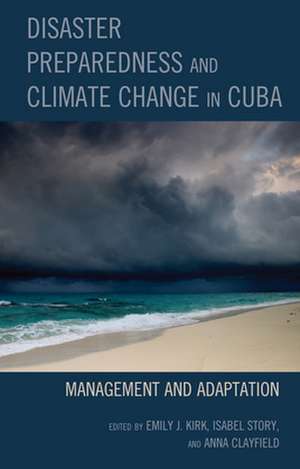Disaster Preparedness and Climate Change in Cuba: Lexington Studies on Cuba
en Limba Engleză Hardback – 18 aug 2021
Din seria Lexington Studies on Cuba
- 23%
 Preț: 649.54 lei
Preț: 649.54 lei - 23%
 Preț: 654.29 lei
Preț: 654.29 lei - 27%
 Preț: 716.53 lei
Preț: 716.53 lei - 23%
 Preț: 648.34 lei
Preț: 648.34 lei - 23%
 Preț: 647.33 lei
Preț: 647.33 lei - 23%
 Preț: 685.85 lei
Preț: 685.85 lei -
 Preț: 394.99 lei
Preț: 394.99 lei - 23%
 Preț: 649.38 lei
Preț: 649.38 lei -
 Preț: 332.26 lei
Preț: 332.26 lei -
 Preț: 376.29 lei
Preț: 376.29 lei - 23%
 Preț: 709.11 lei
Preț: 709.11 lei - 23%
 Preț: 686.27 lei
Preț: 686.27 lei - 27%
 Preț: 725.49 lei
Preț: 725.49 lei - 23%
 Preț: 617.44 lei
Preț: 617.44 lei - 27%
 Preț: 678.83 lei
Preț: 678.83 lei
Preț: 686.86 lei
Preț vechi: 892.03 lei
-23% Nou
Puncte Express: 1030
Preț estimativ în valută:
131.44€ • 136.40$ • 109.87£
131.44€ • 136.40$ • 109.87£
Carte tipărită la comandă
Livrare economică 15-29 martie
Preluare comenzi: 021 569.72.76
Specificații
ISBN-13: 9781793651310
ISBN-10: 1793651310
Pagini: 276
Dimensiuni: 152 x 229 x 24 mm
Greutate: 0.55 kg
Editura: Rowman & Littlefield
Seria Lexington Studies on Cuba
ISBN-10: 1793651310
Pagini: 276
Dimensiuni: 152 x 229 x 24 mm
Greutate: 0.55 kg
Editura: Rowman & Littlefield
Seria Lexington Studies on Cuba
Notă biografică
Edited by Emily J. Kirk; Isabel Story and Anna Clayfield - Contributions by Leidy Casimiro Rodríguez; Anna Clay...
Descriere
Disaster Preparedness and Climate Change in Cuba discusses how, over six decades, Cuba developed a world-leading model of disaster management and climate change adaptation. Comprised of leading scholars and policy makers in the field, this volume questions what makes Cuba's effective model so distinctive and what others can learn from it.
